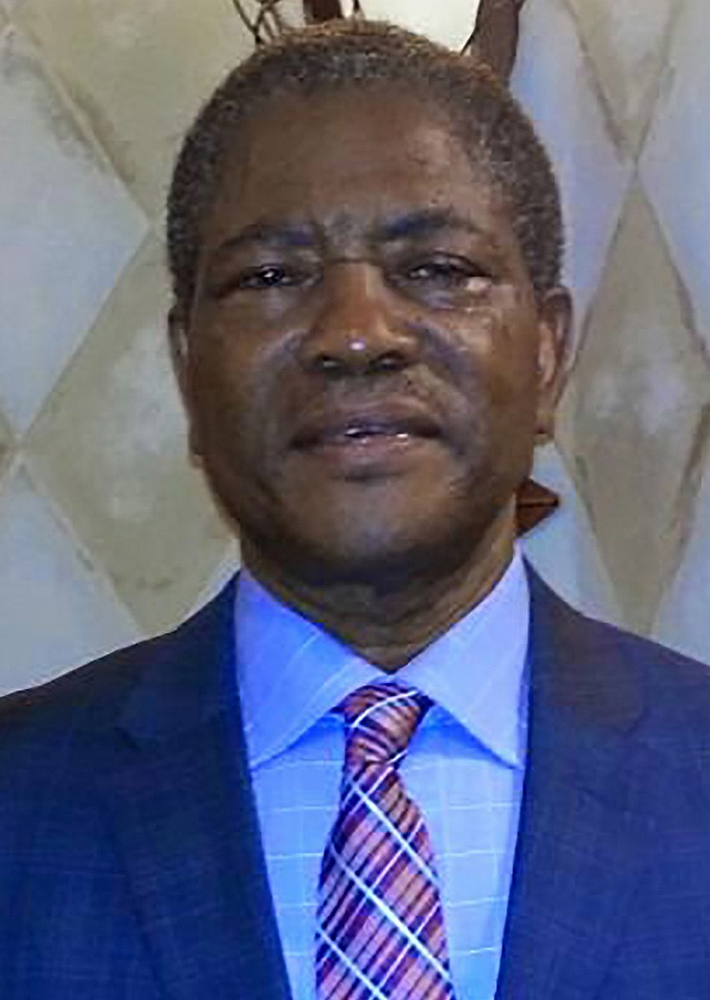



Obituary
Obituary of Moses Edward Mikka-Mukasa
Please share a memory of Moses to include in a keepsake book for family and friends.
Moses Edward Mikka Mukasa was born on February 4, 1942, to Christopher Muso
and Agnes Nakawombe on the Lake Victoria Island of Koome, Mukono District, in
the Kingdom of Buganda - at the time part of the Uganda Protectorate within the
British Empire in East Africa. Ever curious and eager to learn, he was moved to the
mainland for his early education and subsequently attended Bishop Hannington
Primary School in Mukono.
In 1955 he was accepted, on a government scholarship, into King's College Budo
Junior Secondary School, at that time the most prestigious boy's high school in
Uganda. His academic excellence saw him consistently at the top his class, earning
admiration from both peers and teachers. His extracurricular activities included
singing in the choir, and theatre – where he played leading roles in the school's
Shakespeare productions. Beyond the classroom, Moses' athletic prowess shone
brightly. As a key player in the school's cricket and football teams, he not only secured
victories but also won School Colors in both sports, marking him as a versatile and
talented athlete.
In 1960, he was chosen to be a Prefect for his residence - South Africa House, and in
1961, he rose to the esteemed position of School Head Prefect earning him a personal
gift of a Kanzu from His Majesty Sir Edward Mutesa II, the 35th Kabaka (King) of
Buganda, and future first President of Uganda. This coveted position was a testament
to his ability to lead and inspire others, a skill that would serve him well in the years to
come.
These formative years of Moses Mukasa's life were not only marked by personal
achievements but also by the socio-political changes sweeping through Uganda. The
1960s and 1970s were a time of intense political activity and transformation, with
Uganda gaining independence in 1962, and experiencing significant political turmoil
thereafter. Despite these challenges, Moses' determination and dedication to his
studies and sports illustrated a remarkable resilience and adaptability.
After completing his high school education, Moses continued his academic and
athletic journey at Makerere University, one of Africa's most prestigious institutions.
Here, he kept his passion for cricket alive, playing for the university team and later,
the Uganda National Team. His tenure with the national side came during a period of
significant political upheaval, following the expulsion of Asians from Uganda in 1972.
This era saw Moses and his teammates touring countries in East, Central and West
Africa, where he distinguished himself as the first native African wicketkeeper for the
national team, and as a formidable hard-hitting middle-order batsman.
In 1966, he earned a Bachelor of Arts degree in Economics and Political Studies from
Makerere University in Kampala, Uganda. He furthered his education with a Master
of Arts in Economics, Statistics, and Population Studies from the University of
Michigan, Ann Arbor, USA, in 1968. This strong academic foundation would lead to a
distinguished career in population studies, economics, and international development
that spanned over four decades, leaving a significant mark in those fields.
His professional path was dedicated to public service and international development.
His early career saw him at the Ministry of Finance in Uganda, where he served as an
Economist from 1966 to 1968. This role was followed by a series of increasingly
senior positions at the Ministry of Planning and Economic Development in Uganda,
where he rose from Statistician to Chief Government Statistician. During his tenure as
Chief Government Statistician, he oversaw the country's first post-independence
national census in 1969. Although scientific methodology was used for the first time
during the previous two national censuses, in 1948 and 1959 respectively, both these
censuses were conducted separately for African and non-African populations. The
1969 national census, led by Moses, was the first to be conducted jointly for all races,
using more contemporary units of renumeration including, for the first time,
customized indices, and indicators relevant to indigenous African social, cultural, and
economic life. These models remain in use today. Alongside his work as a civil
servant, Moses contributed to academia as a Part-Time Lecturer at Makerere
University's Institute of Statistics and Applied Economics from 1971 to 1977.
After being exiled from Uganda in 1977, his expertise in population and statistical
analysis led to his involvement with various international organizations. In 1978, he
participated in evaluating the First African Census Program funded by the United
Nations Fund for Population Activities (UNFPA), involving the countries of Burkina
Faso, Madagascar, Sierra Leone, Senegal, Somalia, and Sudan. From 1979 to 1989, he
worked at the International Planned Parenthood Federation (IPPF) where he rose
from the position of a Consultant in Monitoring and Evaluation to a Senior Program
Officer for Eastern and Central Africa, and finally to the Sub-Regional Director for
Eastern and Southern Africa. In these capacities, he was instrumental in managing and
advising family planning associations across Africa and coordinating the
implementation of family planning and reproductive health activities.
Moses's career with the United Nations began in earnest in 1989. He was the United
Nations Fund for Population Activities (UNFPA) Country Director for Zambia from
1989-1994. From 1994 to 1998, he served as the UNFPA Representative for
Botswana. During this time, he concurrently served as the Country Director for
Lesotho and Swaziland. His final appointment was as the UNFPA Representative for Ghana, a role he held from 1998 until his retirement. During his tenure in Ghana, he
also served as the United Nations Resident Coordinator from 1999 to 2001.
Moses's responsibilities in these roles were extensive. His work involved planning and
participating in country population assessments, developing country program
strategies, and negotiating project execution and funding modalities. He advised
governments on integrating population considerations into development planning and
policy and acted as a focal point for population information and expertise. He
established and maintained crucial contacts with government authorities, bilateral aid
programs, and non-governmental organizations. He also provided leadership in
coordinating population assistance with bilateral aid agencies, UN agencies, and
NGOs.
Under his leadership, in Zambia, UNFPA initiated the provision and promotion of
family welfare and HIV/AIDS workplace interventions within the private sector,
government and civil society to help organizations and their employees anticipate and
minimize the impacts of HIV/AIDs. In Botswana, he designed the first national
adolescent reproductive health program aimed at reducing teenage pregnancy and
preventing the spread of HIV/AIDS; he chaired the United Nations Theme Group
on HIV/AIDS; and supervised the implementation of the UNFPA Global Training
Program in Population and Development at the University of Botswana. In Lesotho
and Swaziland, UNFPA designed and introduced the HIV/AIDS playing cards which
creating awareness about the HIV/AIDS pandemic.
Among his key achievements during his tenure in Ghana was taking immediate steps
for engaging Government attention and public actions through high level
Advocacy/awareness, preparedness, and funding support that prompted actions to
catalyze policy measures and institutional frameworks against the spread and impact
of HIV and AIDS; culminating in the strengthening of policy and legislative
processes, funding allocations, institutional strengthening through serious
engagements at different levels of the national leadership (The Executive,
parliamentary, religious and traditional leaders, heads of institutions across many
regions of the country).
He also led gender and development policy interventions that heightened awareness
and actions to promote and protect the rights and wellbeing of women, girls, and
other vulnerable groups such as the aged in the society. Policy initiatives to address
violence against women and girls, including attention to harmful practices (such as
FGM, early marriage and others), maternal and adolescent health, ageing, and
attention to and integration of evidence-based population issues and data/statistics in development planning were key interventions during this time. He was also successful
in lobbying for the creation of a government ministry responsible for promoting
gender and children issues; undertook and accomplished an advocacy campaign that
resulted in the government and cultural leaders abolishing the "Trokosi" systems
which involved the enslavement of young girls in shrines to atone for the wrong
doings of their ancestors; identified the need to assist displaced women running away
from neighboring countries of war and conflict, and as a result initiated, prepared and
launched the distribution of sanitary towels and first aid necessities in refugee camps
for women in labour.
Beyond his professional roles, Moses was deeply involved in various organizations
and commissions. He was Chair of the United Nations Theme Group on HIV/AIDS
in Ghana, a co-founder, and board member of the Centre for African Family Studies
(CAFS) in Nairobi, Kenya. He was also a member of the United Nations Population
Commission and the Conference of African Planners and Statisticians. His
commitment to family planning and population issues was further demonstrated by
his roles within the IPPF, where he served as Treasurer of the Africa Regional
Council and Uganda's Representative to various international commissions and
conferences. He was a life member of Family Planning Association of Uganda, as well
as a member of various organizations dedicated to ending poverty, injustice,
inequality, and health disparities.
In his spare time, he was an avid stamp collector, a voracious reader and storyteller, a
Tennis fan, and an ardent supporter of Manchester United, Ghana's Black Stars
Football Team, the Philadelphia Eagles, and the West Indies Cricket Team.
Post retirement, he continued to share his vast knowledge and expertise, volunteering
and working part-time as an AmeriCorps volunteer and Prevention Specialist for The
Philadelphia Aids Consortium.
Moses' contributions to published works in his field included publications on the
post-independence East African censuses and innovative approaches to population
and family planning programs. His work has been cited in significant publications,
including the seminal "Population Growth and Economic Development in Africa,"
published by Heinemann in 1972.
A lifelong and fervent Pan Africanist, his was a life and career marked by a profound
dedication to improving population health and economic development across Africa
and beyond. His legacy continues to influence the fields of population studies and international development, reflecting a life committed to service, education, and
Africa's development.
Moses Mukasa passed away on June 13, 2024, at the University of Pennsylvania
Presbyterian Medical Center in Philadelphia, PA, after a long illness. He is survived
by his wife Sarah; his children Primrose Nakawula, Paulo Gavva Mukasa, Aldrine
Nsubuga, Joyce Nantagya, Solome Mukasa, Christopher Mukasa, Livingstone Mukasa,
Agnes Mukasa; his sister Edith Nakawula; his grandchildren Fiona Namugga, Bena
Nakibirige, Frank Kalule, Dodoviko Kalule, Hilda Namutebi, Jackie Namutebi, Jessica
Namayanja, Joshua Mubiru, Joseline Nakawula, Anfield Nsubuga, Aldrine Nsubuga Jr,
Alden Nsubuga, Alma Nsubuga, Ithel Nsubuga; and great grandchildren Aldrine
Aheebwa, Atarah Nalunkuma.
To send flowers to the family or plant a tree in memory of Moses Mikka-Mukasa, please visit Tribute Store
Saturday
13
July
Visitation at Main Service
11:00 am
Saturday, July 13, 2024
St. Paul Episcopal
7809 Old York Road
Elkins Park, Pennsylvania, United States
Need Directions?
Saturday
13
July
Funeral Service
11:00 am
Saturday, July 13, 2024
St. Paul Episcopal
7809 Old York Road
Elkins Park, Pennsylvania, United States
Need Directions?
Online Memory & Photo Sharing Event
Ongoing
Online Event
About this Event

In Loving Memory
Moses Mikka-Mukasa
1942 - 2024
Look inside to read what others have shared
Family and friends are coming together online to create a special keepsake. Every memory left on the online obituary will be automatically included in this book.
Philadelphia
7112 North Broad Street
215-549-4700
Upper Darby/Drexel Hill
3215 Garrett Road
610-713-5560






